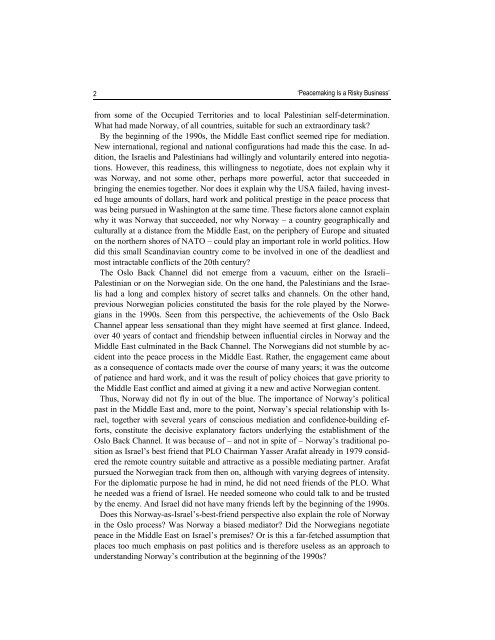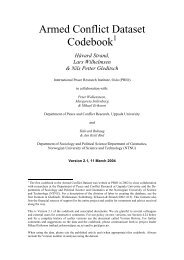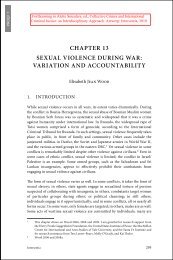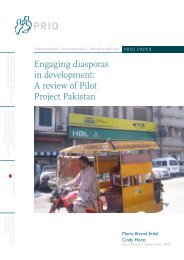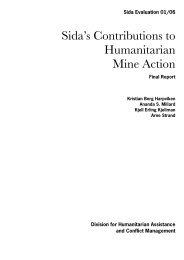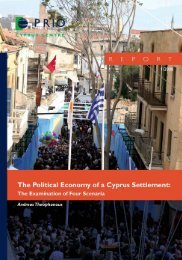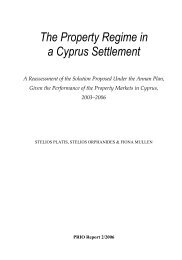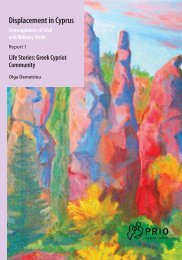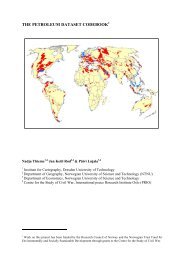Peacemaking Is a Risky Business - PRIO
Peacemaking Is a Risky Business - PRIO
Peacemaking Is a Risky Business - PRIO
Create successful ePaper yourself
Turn your PDF publications into a flip-book with our unique Google optimized e-Paper software.
2 ‘<strong>Peacemaking</strong> <strong>Is</strong> a <strong>Risky</strong> <strong>Business</strong>’from some of the Occupied Territories and to local Palestinian self-determination.What had made Norway, of all countries, suitable for such an extraordinary task?By the beginning of the 1990s, the Middle East conflict seemed ripe for mediation.New international, regional and national configurations had made this the case. In addition,the <strong>Is</strong>raelis and Palestinians had willingly and voluntarily entered into negotiations.However, this readiness, this willingness to negotiate, does not explain why itwas Norway, and not some other, perhaps more powerful, actor that succeeded inbringing the enemies together. Nor does it explain why the USA failed, having investedhuge amounts of dollars, hard work and political prestige in the peace process thatwas being pursued in Washington at the same time. These factors alone cannot explainwhy it was Norway that succeeded, nor why Norway – a country geographically andculturally at a distance from the Middle East, on the periphery of Europe and situatedon the northern shores of NATO – could play an important role in world politics. Howdid this small Scandinavian country come to be involved in one of the deadliest andmost intractable conflicts of the 20th century?The Oslo Back Channel did not emerge from a vacuum, either on the <strong>Is</strong>raeli–Palestinian or on the Norwegian side. On the one hand, the Palestinians and the <strong>Is</strong>raelishad a long and complex history of secret talks and channels. On the other hand,previous Norwegian policies constituted the basis for the role played by the Norwegiansin the 1990s. Seen from this perspective, the achievements of the Oslo BackChannel appear less sensational than they might have seemed at first glance. Indeed,over 40 years of contact and friendship between influential circles in Norway and theMiddle East culminated in the Back Channel. The Norwegians did not stumble by accidentinto the peace process in the Middle East. Rather, the engagement came aboutas a consequence of contacts made over the course of many years; it was the outcomeof patience and hard work, and it was the result of policy choices that gave priority tothe Middle East conflict and aimed at giving it a new and active Norwegian content.Thus, Norway did not fly in out of the blue. The importance of Norway’s politicalpast in the Middle East and, more to the point, Norway’s special relationship with <strong>Is</strong>rael,together with several years of conscious mediation and confidence-building efforts,constitute the decisive explanatory factors underlying the establishment of theOslo Back Channel. It was because of – and not in spite of – Norway’s traditional positionas <strong>Is</strong>rael’s best friend that PLO Chairman Yasser Arafat already in 1979 consideredthe remote country suitable and attractive as a possible mediating partner. Arafatpursued the Norwegian track from then on, although with varying degrees of intensity.For the diplomatic purpose he had in mind, he did not need friends of the PLO. Whathe needed was a friend of <strong>Is</strong>rael. He needed someone who could talk to and be trustedby the enemy. And <strong>Is</strong>rael did not have many friends left by the beginning of the 1990s.Does this Norway-as-<strong>Is</strong>rael’s-best-friend perspective also explain the role of Norwayin the Oslo process? Was Norway a biased mediator? Did the Norwegians negotiatepeace in the Middle East on <strong>Is</strong>rael’s premises? Or is this a far-fetched assumption thatplaces too much emphasis on past politics and is therefore useless as an approach tounderstanding Norway’s contribution at the beginning of the 1990s?


